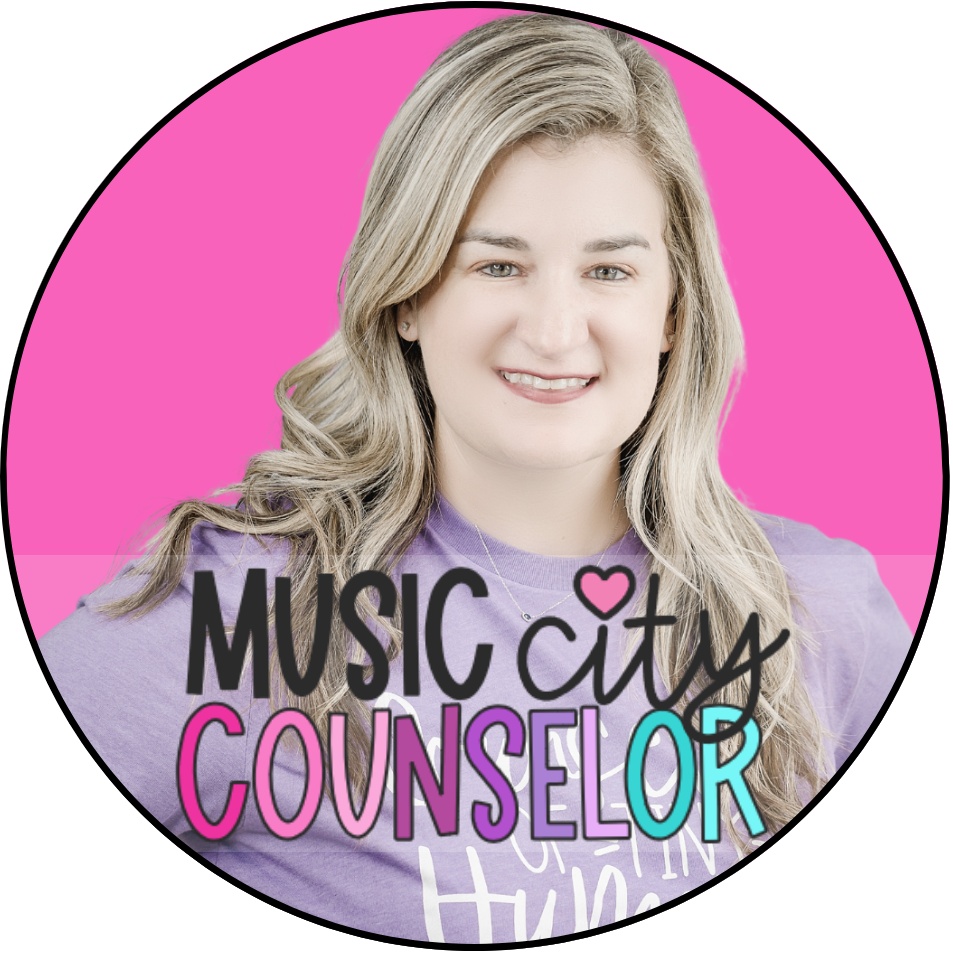
Hey y’all! Thanks so much for stopping by. My name is Laura and I am an Elementary School Counselor turned Curriculum Writer. At my precious school in Nashville, TN, 97% of my students were living in …
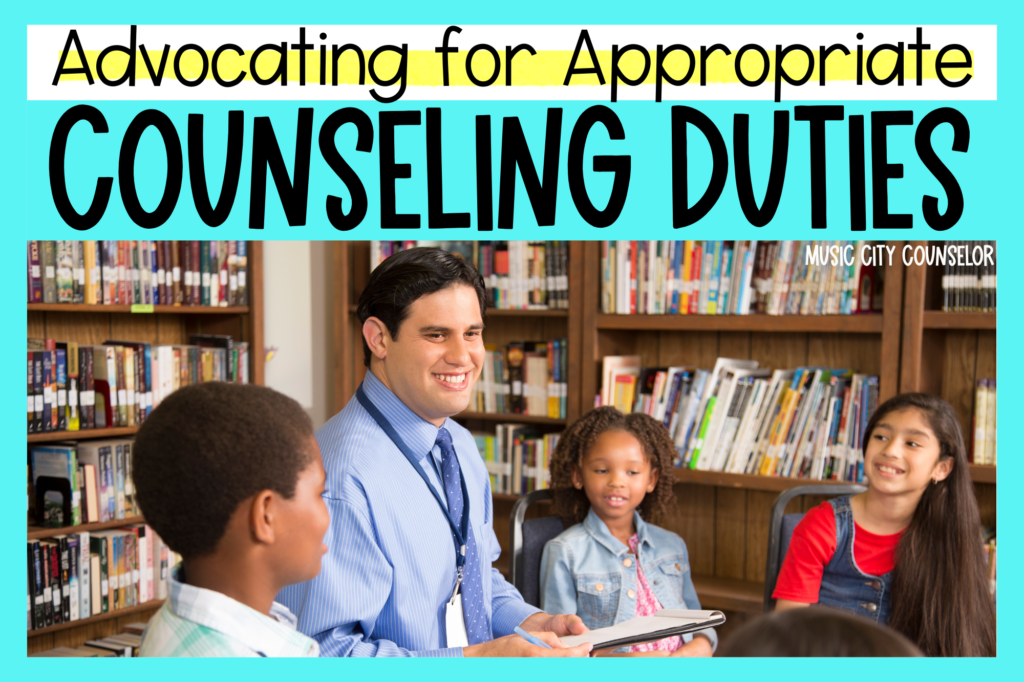
Lunch duty. Recess duty. Car rider duty. Test coordination. Substitute teaching. School counselors, you know the drill. All of those “little” responsibilities that are totally unrelated to our training or profession, but add up to occupy a LOT of our time.
What if there was a way to advocate for our role as school counselors, and have some (if not all) of these inappropriate duties taken off of our plate? It’s not always an easy road, and if you’re anything like me, the thought of confronting authority or going “against the grain” is very scary. The full process may take a year (or more!), but I’m here to tell you that it is possible. And the payoff of being able to serve your students in the way that you envision is so, very worth it.
In this post, I share with you my four-step process for advocating for our profession and removing inappropriate duties from our role. Also, be sure to check out my next post, where you’ll hear success stories from practicing school counselors of how they molded their position to best serve their students and stakeholders.
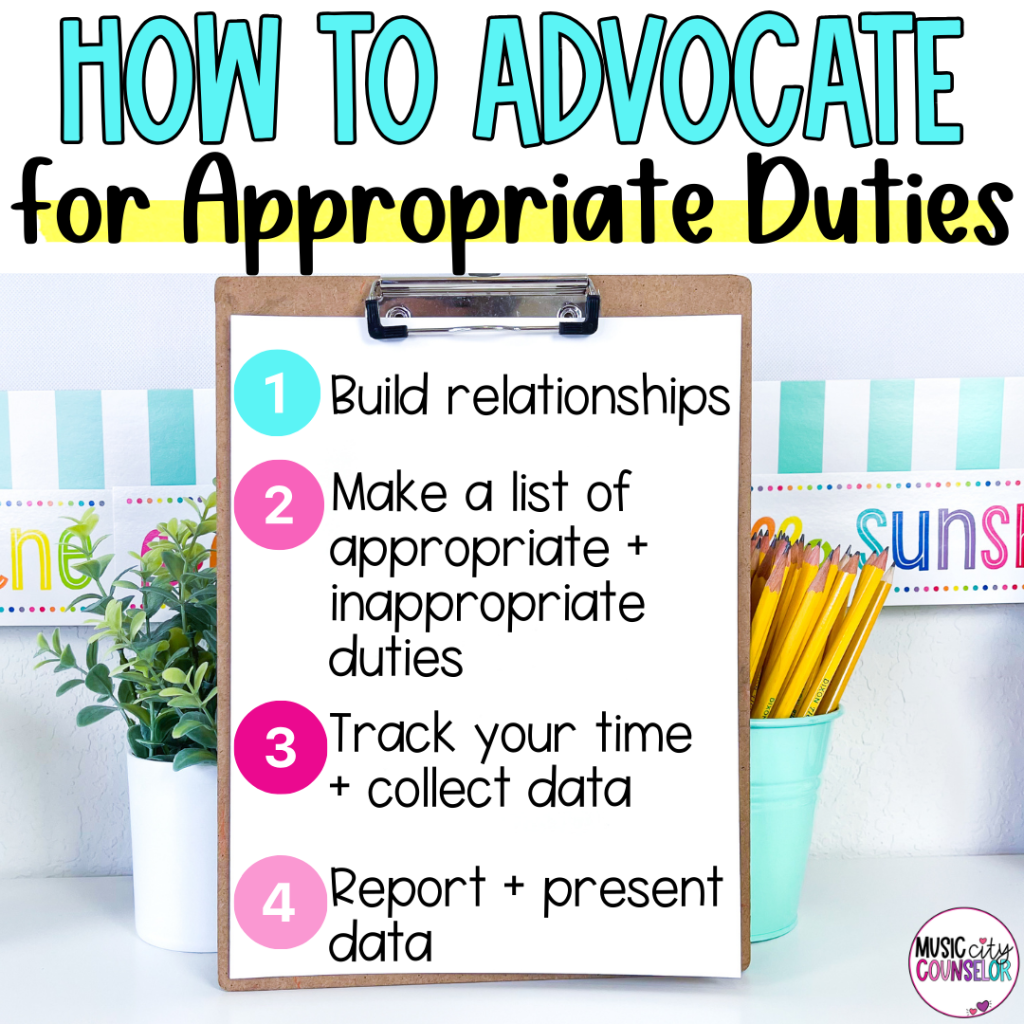
Before we tackle making any major changes to our role, I recommend building relationships first. If you’re new to the job, or your principal is new to your building, you definitely can create change right away. But the more trust, buy-in, and respect that you have from your school community, the more likely you are to be successful in making this role exactly how you want it to be.
There are so many ways to build meaningful relationships with your stakeholders! Here are a few recommendations for you that have worked well for me:
Per the ASCA National Model, 80% of school counselors’ time should be spent on direct (instruction, appraisal and advisement, counseling), and indirect (consultation, collaboration, referrals) student services. Only 20% of our time should be spent on program planning and school support activities. ASCA further illustrates appropriate vs. inappropriate duties for school counselors in the chart below:
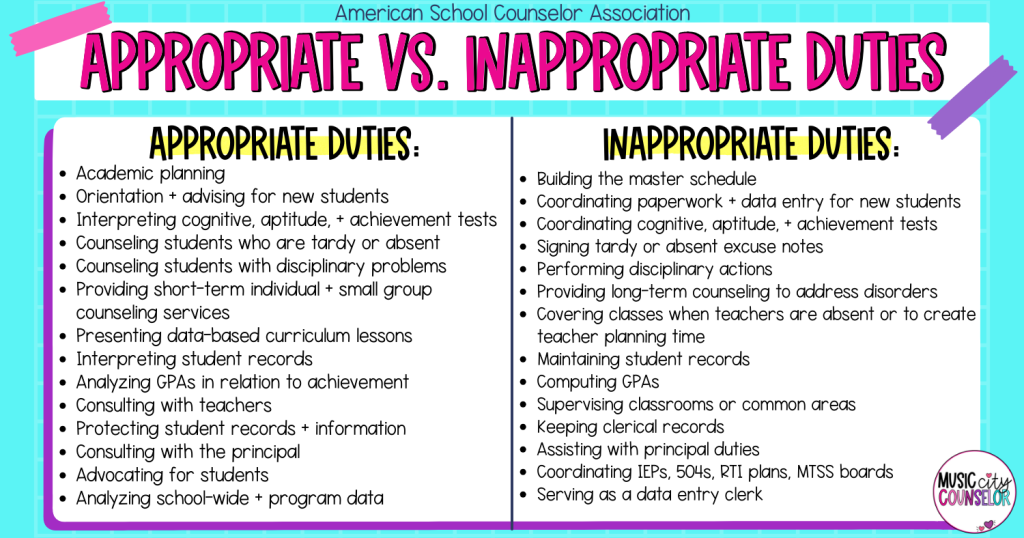
In an ideal world, we wouldn’t have any responsibilities from the column on the right. But, with the lack of substitute teachers, inadequate funding for mental health in schools, etc., we do have to remember that working in a school is all about “give and take.” For example, although I didn’t love starting the day with frizzy hair in the Nashville humidity, I did contribute to “fair share duties” at my school by supervising the car rider line. Helping with car rider duty showed that I was a team player, and also had many added benefits for my role (i.e. laying eyes on my students first thing in the morning and starting their day with a smile, parents knowing my face, etc).
What becomes problematic, however, is when inappropriate duties begin to fill, or even dominate, our time. A friend of mine, for example, spends every single Tuesday and Thursday operating her school’s PBIS reward store. This means that no counseling services of any kind are taking place in her school two full days a week! For me, test coordination occupied just about every minute of my time for 2 weeks in the fall (English Learner testing) and 3 weeks in the spring (state testing).
Every school counseling role looks different, so you need to decide which inappropriate duties are interfering the most with your ability to serve students and stakeholders. Maybe you’d like to be removed from the specials rotation, stop covering classes, or supervising recess. Start this process by making a list of both the appropriate and inappropriate parts of your role. Then, circle which inappropriate duties you are going to focus on getting removed from your plate. I would recommend picking your battles and focusing on removing one inappropriate duty at a time. But, if you’re feeling bold and have a great relationship with your administrator, you may be able to make several changes at once to your role! You can see the list of appropriate and inappropriate duties in my position below. I chose to focus on removing test coordination (and was successful at doing so!)
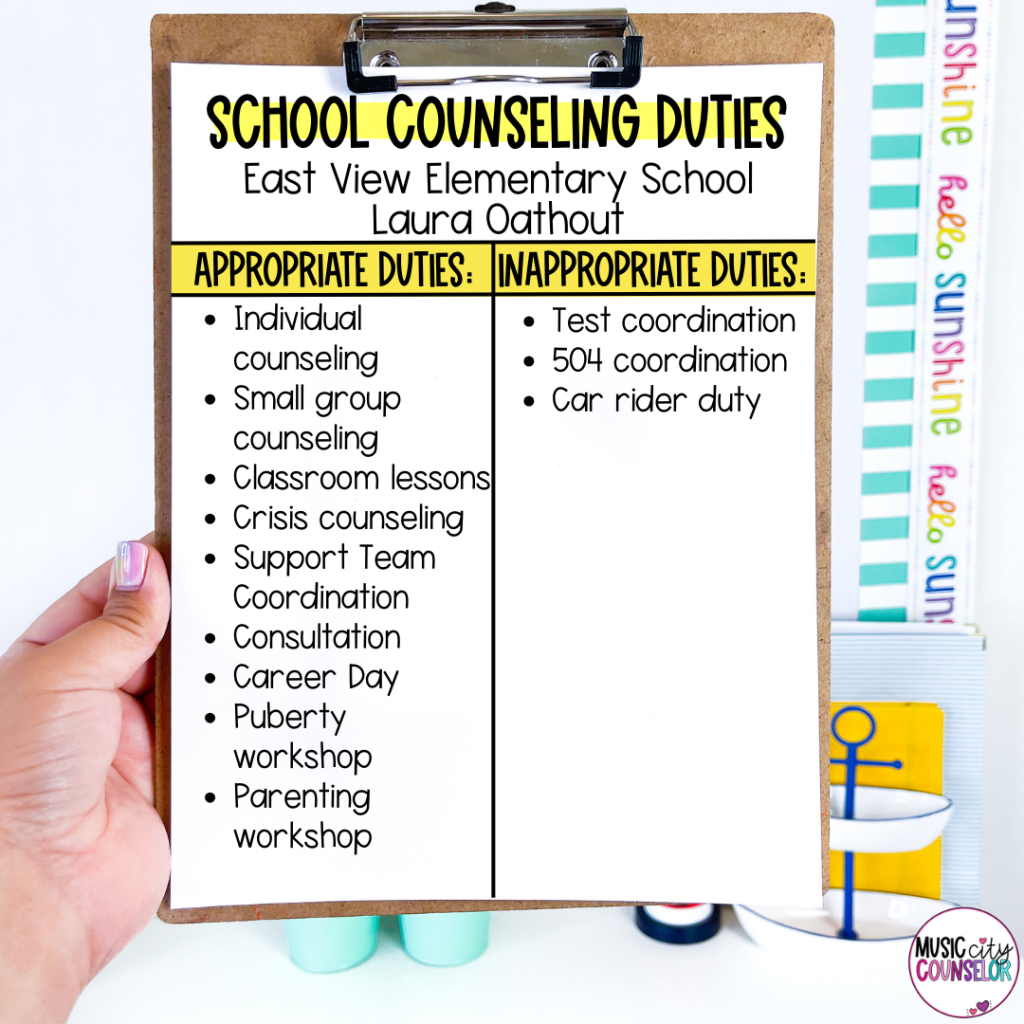
Just about everything that we do as school counselors is data-driven, and advocating for our role is no different. Nothing proves our point better than hard numbers that show how we are spending our time and how we could be better spending our time. Tracking your time can feel like a bit of a headache, but there are several apps and programs available that make this process a lot easier. ASCA recently released a new app that lets you track your time – in real time – and compare it to ASCA’s recommendations. I have also heard good things about EZAnalyze and SCUTA. If these programs feel a bit overwhelming to you, you can always simply log your time in an Excel spreadsheet, in your Outlook/work calendar, or even with a pencil/paper notebook! Personally, I used EZAnalyze to track my individual and small group counseling, a pad of paper by my work phone to track parent contacts, and my Outlook calendar to track classroom lessons and meetings. With a little trial and error, you can find the method that works best for you. The most important thing is to stick to it! I found that logging my services immediately after they were complete brought the most consistent results.
Once your time is tracked and your data is collected, I recommend creating a School Counseling Report once each quarter, and once at the end of the school year. This one-page document tells the “story” of your role, through honest data about the interventions, services, and programming that you offered. You can also use it to describe your program highlights such as classroom lesson topics, small group offerings, and special events. This is your chance to brag a bit about the critical value of your program, and shout your worth from the rooftops!
Two more tools to help you showcase the value of your interventions and services are my Small Group Counseling Data Summary Report and Individual Counseling Data Report. They let counselors communicate “need-to-know” information such as counseling goals, progress, and data with stakeholders…and are another great way to share the critical contributions of your program! I recommend bringing them along to your evaluation conferences with your principal (and suggest leaving the names off of the documents to respect student confidentiality!)

Once you feel ready to meet with your principal and advocate for the removal of inappropriate duties, your quarterly and counseling data reports will offer hard data and proof of your accomplishments…and help you describe what more you could offer if inappropriate duties were taken off of your plate.
Speaking your truth and advocating for yourself takes both preparation and courage. Here are some tips for the “big talk” to help make your conference with your principal as successful as possible:
Even if you present the most beautiful data and tell the most compelling stories, it is possible that your principal just won’t agree. If this is the case, you have several options. You can continue gathering data and choose to present to your principal again in the future. You could team up with other counselors and attempt to bring about change at the district level by sharing your data with your Director of School Counseling or Superintendent. Or, if your voice simply isn’t being heard, you could look for a position in another school or district that is a better match for your vision.
Have you successfully advocated for removing inappropriate duties from your plate? If so, how did you do it? Or, if you haven’t begun this process yet, which tips from this post were the most helpful to you in getting started? Please comment below, I’d love to hear from you!

| Cookie | Duration | Description |
|---|---|---|
| cookielawinfo-checkbox-analytics | 11 months | This cookie is set by GDPR Cookie Consent plugin. The cookie is used to store the user consent for the cookies in the category "Analytics". |
| cookielawinfo-checkbox-functional | 11 months | The cookie is set by GDPR cookie consent to record the user consent for the cookies in the category "Functional". |
| cookielawinfo-checkbox-necessary | 11 months | This cookie is set by GDPR Cookie Consent plugin. The cookies is used to store the user consent for the cookies in the category "Necessary". |
| cookielawinfo-checkbox-others | 11 months | This cookie is set by GDPR Cookie Consent plugin. The cookie is used to store the user consent for the cookies in the category "Other. |
| cookielawinfo-checkbox-performance | 11 months | This cookie is set by GDPR Cookie Consent plugin. The cookie is used to store the user consent for the cookies in the category "Performance". |
| viewed_cookie_policy | 11 months | The cookie is set by the GDPR Cookie Consent plugin and is used to store whether or not user has consented to the use of cookies. It does not store any personal data. |
2 Responses
Thank you so much for this post. I used the steps to prepare for a third quarter program analysis with my admin. I am at the end of my second year at this wonderful school and was overwhelmed with being in the rotation. They took me out right after our meeting!
I’m a little overwhelmed now with the “what’s next”, but so proud of myself and excited about how this may help our sweet school! THANK YOU!
Aww Lacey your sweet words made my day, thank you so much! I’m so glad that my plan was so helpful to you and so proud of you for getting OUT of the rotation! What an accomplishment! Go girl and enjoy your newfound time for more services to students! 🙂